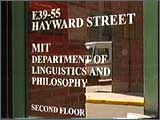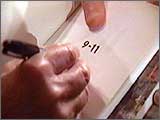|
|
 |
 |
 |
|
|
 |
 |
 |
For decades, the world-renowned intellectual
Noam Chomsky has been a quiet but steadfast critic of United
States foreign policy. In the aftermath of the terrorist attacks
of September 11, his profile took a quantum leap, as he provided
much-demanded analysis and historical perspective to concerned
citizens throughout the world.
 Chomsky,
who will turn 74 this year, continues his studies in linguistics
as an emeritus professor at the Massachusetts Institute of Technology.
His linguistic theories have revolutionized the field and won
countless academic honors, including Japan’s Kyoto Prize.
At the same time, since the Vietnam War, he has maintained an
active political opposition and published prolific criticism
of the exercise and abuse of US power overseas. After September
11, no one has been as pointed and relentless in calling the
US to task for its own support and responsibility for countless
acts and campaigns of terrorist aggression, both historically
and in the present. Chomsky,
who will turn 74 this year, continues his studies in linguistics
as an emeritus professor at the Massachusetts Institute of Technology.
His linguistic theories have revolutionized the field and won
countless academic honors, including Japan’s Kyoto Prize.
At the same time, since the Vietnam War, he has maintained an
active political opposition and published prolific criticism
of the exercise and abuse of US power overseas. After September
11, no one has been as pointed and relentless in calling the
US to task for its own support and responsibility for countless
acts and campaigns of terrorist aggression, both historically
and in the present.
Chomsky's voice may be unpopular--he is totally ignored by the
mainstream American press--but his incisive arguments, based
on decades of research and analysis, deserve to be heard and
considered. "Power and Terror" presents the latest
in Noam Chomsky's thinking, through a lengthy interview and
a number of public talks given on the West and East coasts of
the US during the spring of 2002.
 What
emerges from the footage is a portrait of the activist intellectual,
who has been called a “rebel without a pause” by Bono,
the lead singer of the band U2. He is the most important voice
of dissent in the United States today. What
emerges from the footage is a portrait of the activist intellectual,
who has been called a “rebel without a pause” by Bono,
the lead singer of the band U2. He is the most important voice
of dissent in the United States today.
“Power and Terror” is directed by John Junkerman,
whose portrait of the atomic-bomb artists Maruki Iri and Toshi
was nominated for an Academy Award. It is his second film done
in cooperation with Siglo, an independent Japanese company that
has been producing socially-engaged films for over 15 years.
Junkerman’s first film with Siglo, “Uminchu: The Old
Man and the East China Sea,” featured a marlin fisherman
on the island of Yonaguni; it was released theatrically in Japan
in 1990.
|
 |
|
|
|
 |
|